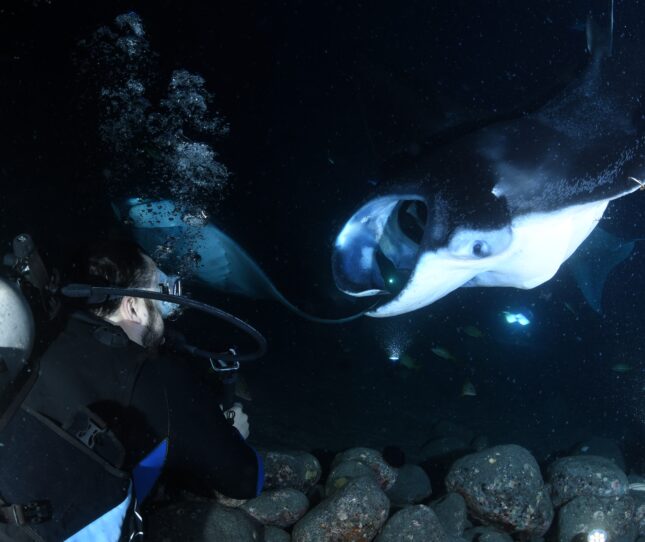For this Faculty Feature, we spoke with Samuel J. Ballentine, MD. Dr. Ballentine’s clinical and research interests include Gastrointestinal and Pancreaticobiliary Pathology, Liver Pathology and Inflammatory Bowel Disease. In addition to his clinical work and research, Dr. Ballentine is associate director of the department’s residency program, where he provides mentorship for the next generation of pathologists.
Tell us about your background. Where did you grow up, and when did you first become interested in science and medicine?
I was born and raised in Rhode Island after my father, George, now a retired civil engineer who drafted the blueprints for major highways and airport runways, met my mother, June, while working oversees in Malaysia. They settled down in Rhode Island in 1985, having me soon after. My father was the first in his family to graduate from college, and my mother, the youngest in a large family with 5 sisters and 4 brothers raised in rural Malaysia, never finished high school. As such, I was the first to pursue either graduate or medical education in my family.
My journey into science, medicine and ultimately pathology was certainly not straightforward and had several twists and turns that I never expected. I was a bit aimless in high-school, initially exploring options to join the Airforce as a career officer and even joined my high-school’s Airforce JROTC to accelerate that goal. Later, realizing I had other options due to my interest and aptitude for the sciences, I explored becoming a pharmacist. But after my application for pharmacy school at the University of Rhode Island was rejected, I was instead accepted under my back-up major in Chemistry. Unfortunately, during my freshman year, my mother’s breast cancer recurred, and I was exposed to the health care system and the important role physicians had in caring for the sick and dying. Those experiences laid the foundation for my decision to pursue medical school following her death in 2005.
What is your career path?
After undergraduate, I pursued a 1-year post-baccalaureate research training award at the NIH and was accepted into a research lab in the Division of Allergy and Infectious Diseases elucidating the mechanisms that mycobacterium tuberculosis and related mycobacteria use to evade host immune responses. The work was so fascinating that when I matriculated into medical school the following year at the New York University School of Medicine, I had the plan to become a clinical infectious disease specialist.
I was so driven by this goal that I made the mistake of not exploring other specialties and certainly wasn’t exposed to pathology as a career option. I realized way too late (after matching into an internal medicine program) that clinical infectious disease was not as interesting to me as the research side and after careful thought pivoted to pathology after meeting several pathology residents through mutual friends and learned it better fit my ideal role as a clinician-scientist while also keeping open the potential to continue with my initial interests in ID though the field of laboratory infectious diseases.
Being accepted into pathology residency at the Icahn School of Medicine at Mount Sinai in New York City was a monumental relief. I was concerned I would not match due to my switch from internal medicine with essentially no prior pathology experience. Luckily, Mount Sinai gave me a chance to prove myself and had incredibly supportive faculty, co-residents, and program directors to help in my transition. Several of the most supportive faculty happened to be GI pathologists which ultimately became my mentors and enticed me to follow in their footsteps and remain for a GI pathology fellowship.
Immediately following fellowship, I started my first academic position at WashU as an assistant professor with career goals focused on providing excellent patient care, medical education, and two years later I became an associate program director for the pathology residency.
What are your favorite parts of your current role?
I understand the importance that faculty and program directors had in supporting and molding my own journey through training, so I truly enjoy and aspire to provide that same type of support for the next generation of pathologists. Learning about residents’ aspirations, seeing their accomplishments, and ultimately growing with them during a difficult and stressful part of their life brings me joy. At the same time, as a clinician-educator, I take pride in being a pivotal member of a multidisciplinary clinical team and during that process showing residents the difference a good pathologist can make in providing excellent patient care, like the care provided to my mother.
What is a memorable moment you have had while working in the department?
My most memorable moments are usually related to struggling residents who’ve come to me expressing doubts about finishing residency, passing the Boards, or having apprehensions about becoming a good pathologist, and then seeing them graduate and have successful careers!
What special skills or talents do you have that people may not know about? What are some of your favorite hobbies or activities?
Outside of work, I’m a bit of a technology geek, having built my own computer to play video games and use as a home movie theater. Two years ago, I learnt how to ride a motorcycle and scuba dive! I currently try to ride my Honda Rebel 500 to work any time the weather allows. I also enjoy cooking and exploring new recipes and cooking methods and have been experimenting with sous vide and making fresh pasta!


Visit our Faculty Features archives to read more faculty member profiles.